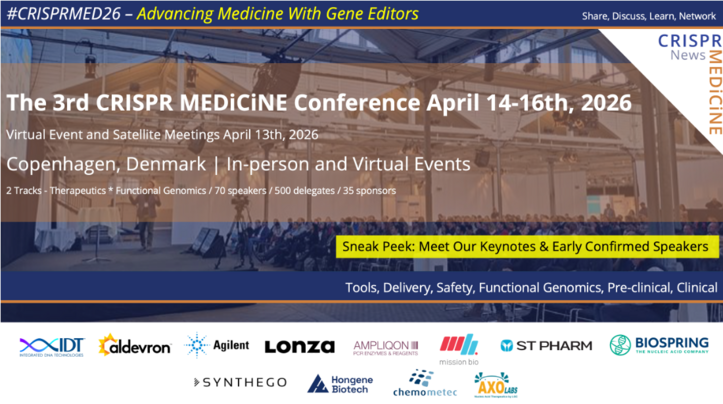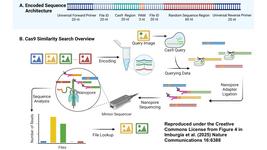Clinical Update: Editas Medicine Doses First Patient in CRISPR Trial for Sickle Cell Disease
Do you plan to organise a webinar?
Why not use the CMN platform and get exposed to the global gene editing community.
More details here.
In a recent press release, Editas Medicine announced clinical achievements in the development of its CRISPR-based therapeutic candidate EDIT-301 for the treatment of sickle cell disease (SCD). Among the updates, the company reported successful neutrophil and platement engraftment of the first patient dosed with EDIT-301 for SCD.
EDIT-301 is an autologous (i.e. patient-derived) CRISPR-edited cell therapy that is currently being evaluated in the Phase 1/2 Ruby trial for SCD, and a Phase 1/2 trial for the related disorder tranfusion-dependent beta thalassemia (TDT). EDIT-301 works by reactivating foetal haemoglobin (HbF) production, thereby compensating for the lack of functional adult haemoglobin in individuals with SCD (see Fact Box).
A CRISPR-Cas12a-edited cell therapy designed to reactivate foetal haemoglobin
EDIT-301 is developed using a CRISPR-Cas12a ribonucleoprotein to enhance the HBG1/2 promoter region in the beta-globin locus of patient-derived haematopoietic stem cells (HPSCs). Naturally-occurring HbF-inducing mutations at the HBG1/2 region support the clinical relevance of using gene editing to enhance the HBG1/2 promoter, and this strategy has been shown to increase the red blood cell levels of HbF.
EDIT-301 is the first experimental medicine in development using CRISPR-Cas12a gene-editing technology, and dosing of the first patient in the RUBY trial marks the first time that Editas' highly engineered AsCas12a enzyme has been used to edit human cells in a clinical trial.
Editas presented data at the 25th European Hematology Association meeting in June 2020 demonstrating that red blood cells derived from EDIT-301 HSPCs exhibit a sustained in vivo increase in HbF in animal models.
In August 2020, Editas obtained Rare Pediatric Disease Designation for EDIT-301 as a potentially best-in-class treatment for SCD in children from birth to 18 years. The company obtained FDA clearance to initiate the RUBY trial in January of this year, but it first had to resolve a partial clinical hold and submit an improved potency assay to the FDA, according to a company press release on Editas’ website at that time. That clinical hold has now been released, according to the recent press release.
FACT BOX: Sickle Cell Disease and Foetal Haemoglobin
Sickle cell disease (SCD) results from a single-point mutation in the haemoglobin subunit beta (HBB) gene and is associated with a range of symptoms and life-limiting complications. Vaso-occlusive crises (VOEs or VOCs) are the most commonly encountered complication in severe SCD, and these occur when small blood vessels get blocked because of sickled red blood cells which tend to be stiffer than healthy cells, and because the defective form of haemoglobin seen in SCD (haemoglobin S) renders the red blood cell membranes sticky.
Daily treatment for SCD patients is limited to symptom control, dietary intervention and pain management. While a bone marrow transplant from a healthy matched donor has traditionally been the only (albeit slight) hope of a cure for the haemoglobinopathies, gene-editing technology unleashes the possibility to cure a patient using their own cells. Central to many of the current approaches is foetal haemoglobin (HbF).
HbF is highly expressed and critical during foetal development, but then rapidly suppressed early in life. Extensive research on the molecular mechanisms of the haemoglobinopathies revealed that the B-cell lymphoma/leukaemia 11A gene, BCL11A, is a negative regulator of HbF expression, and that its disruption could restore HbF expression and reverse SCD in mice by compensating for the lack of functional adult haemoglobin. Since the discovery of this so-called haemoglobin switch, reactivation of HbF expression has emerged as a dominating therapeutic strategy for SCD (as well as beta-thalassemia).
The RUBY Trial
During the RUBY trial, participants at multiple centres in the U.S. and Canada will receive a single intravenous infusion of EDIT-301 after a myeloablative conditioning treatment with busulfan. Myeloablative conditioning destroys the participant’s own bone marrow cells and serves to suppress the immune system so that the infused therapy, in this case EDIT-301 cells, will not be rejected.
The trial’s primary outcome measure is the difference in the rates of severe VOEs requiring medical attention pre- and post-treatment. During a VOE or VOC, the affected tissues lack oxygen, which may result in major damage and severe pain. The occurrence of such events will be monitored for up to 2 years following infusion with EDIT-301.
The trial includes a number of secondary outcome measures that include parameters related to red blood cell health, including HbF levels, haemoglobin levels, number of blood transfusions required to manage disease and number of annual hospital visits, all within 2 years following treatment.
According to the recent press release, Editas has successfully edited HPSC from patients in preparation for reinfusion and remains on track to announce top-line clinical data by year-end. The RUBY trial is expected to be complete in August 2025.
EDIT-301 is one of 7 gene-editing therapeutic candidates under investigation for the treatment of SCD. You can read about all of the other candidates in our up-to-date SCD gene-editing roundup.
You can find all our previous news articles about gene-editing clinical trials here. For a complete overview of CRISPR IND approvals and ongoing gene-editing trials, check out CRISPR Medicine News' Clinical Trials Database.
To get more of the CRISPR Medicine News delivered to your inbox, sign up to the free weekly CMN Newsletter here.
Tags
ArticleNewsClinical News UpdatesSickle Cell Disease, SCDEditas Medicine, Inc.
CLINICAL TRIALS
Sponsors:
Suzhou Maximum Bio-tech Co., Ltd.
Sponsors:
Zhejiang University







